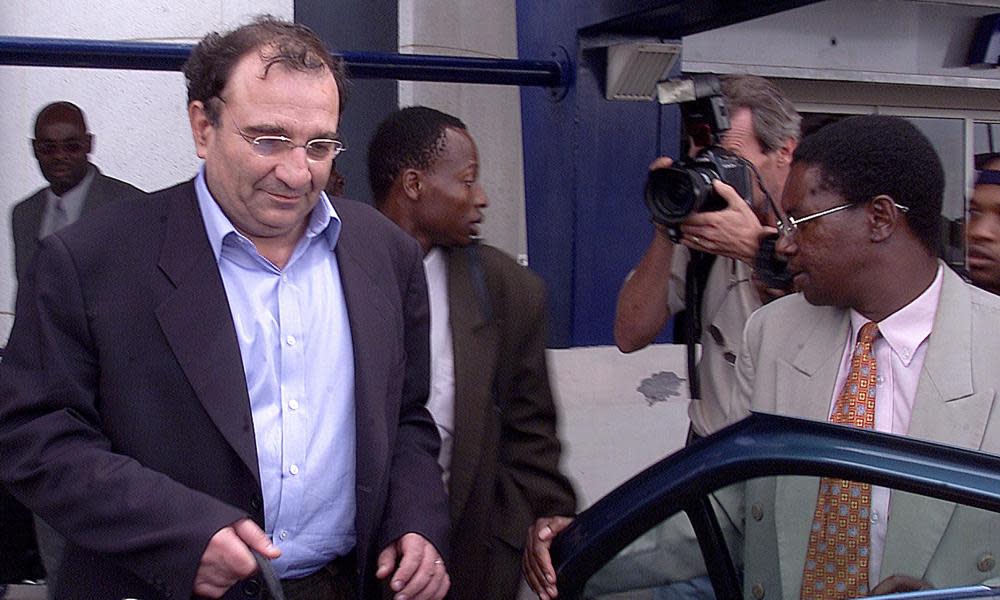Myanmar military hires PR agent to explain 'real situation' to west

Accused of crimes against humanity, an illegal government takeover and gunning down protesters, Myanmar’s military is seeking to rebrand itself in foreign capitals, recruiting a former Israeli military intelligence official turned lobbyist with a record defending controversial clients.
Ari Ben-Menashe, a Tehran-born, Israeli-Canadian lobbyist, was hired by the Tatmadaw this week to “assist in explaining the real situation in the country”, according to a consultancy agreement reported by Foreign Lobby, an outlet that tracks foreign government influence operations in Washington.
Related: Myanmar: Tens of thousands turn out for Sunday protests despite overnight raids
In a decades-long career rarely out of the headlines, Ben-Menashe, a former arms dealer, has worked for the longtime Zimbabwean ruler Robert Mugabe, Sudan’s military junta and presidential candidates in Venezuela, Tunisia and Kyrgyzstan, among others.
He confirmed the agreement in media interviews, claiming he is being paid “a big amount” and will receive a bonus if military sanctions against Myanmar military leaders are lifted.
Ben-Menashe said his political consulting firm, Dickens & Madson Canada, had been hired by Myanmar’s generals to help them communicate with the US and other countries who he said “misunderstood” them.
Messages he is pushing include that the country’s top civilian leader, Aung San Suu Kyi, who the military arrested in a 1 February coup, played a larger role than previously known in a violent campaign of repression against the Rohingya people, and was allowing the country to drift into China’s sphere of influence.
The agreement emerged as protests against the army’s coup continued in at least a half-a-dozen Myanmar cities on Sunday, following an evening of raids against suspected dissidents and leaders of a civil-disobedience movement that includes some of the country’s top diplomats and other civil servants.
Police fired tear gas and stun grenades at protesters in the country’s main city Yangon and in Lashio, a town in the northern Shan region, videos showed. A witness said police opened fire to break up a protest in the historic temple town of Bagan, and several residents said in social media posts that live bullets were used. There was no word of any casualties.
An official from Aung San Suu Kyi’s party died overnight in police custody on Sunday, according to his associates. The cause of Khin Maung Latt’s death was not known, but Reuters saw a photograph of his body with a bloodstained cloth around the head.
Sithu Maung, a member of the dissolved parliament, said in a Facebook post that Khin Maung Latt was his campaign manager and was arrested on Saturday night in the Pabedan district of Yangon. Police declined to comment.
Ben-Menashe, 69, first came to prominence in the US for alleging that then presidential candidate Ronald Reagan had conspired with Iran’s revolutionaries not to release American hostages during his 1980 election campaign against Jimmy Carter.
He was also quoted in reports claiming to have helped to broker arms sales in what became known as the Iran-Contra affair, in which senior US officials sold weapons to the Islamic Republic of Iran to fund a secret war against leftwing groups in Latin America.
In the UK, he was the source of a claim that publisher Robert Maxwell was a Mossad agent. Robert Maxwell denied the claim and sued, but died before the case could be heard.
In 2002, Ben-Menashe was part of a sting that claimed to have caught then Zimbabwean opposition leader Morgan Tsvangirai discussing the potential assassination of Mugabe.
He provided a glimpse into his lobbying efforts in interviews this weekend in which he claimed the army launched the 1 February coup in order to prevent the civilian-led government from drifting further into China’s orbit.
“There’s a real push to move towards the west and the United States as opposed to trying to get closer to the Chinese,” Ben-Menashe told Reuters. “They don’t want to be a Chinese puppet.”
The claim could not be verified – Aung San Suu Kyi is under house arrest, facing charges including sedition, and has not been able to give interviews – but it appears to be an attempt to position the junta alongside repressive governments elsewhere in the world, such as in Egypt, that enjoy western government patronage as self-appointed bulwarks against extremism or reliable allies against growing Chinese influence.
Ben-Menashe told Foreign Lobby that Aung San Suu Kyi had also played a significant role in the marginalisation of the Rohingya people, a Muslim minority who have fled successive crackdowns that have been likened to genocide.
“Aung San Suu Kyi as leader was the one who did in the Rohingyas, not the army,” he said.
Aung San Suu Kyi repeatedly defended the military’s violence including at The Hague in 2019, leading to calls for her to be stripped of accolades including the Nobel peace prize.
But a UN fact-finding mission into the alleged atrocities implicated top Myanmar army leaders as responsible for planning and carrying out the violence.
The junta justified its coup by claiming a November 2020 election in which its affiliated political party was trounced by Aung San Suu Kyi’s National League for Democracy.
Ben-Menashe told Reuters the junta could prove the vote was rigged and that ethnic minorities were blocked from voting, but provided no evidence. Election observers have said there were no major irregularities.
He said that on his two visits to the country since the coup, “disturbances weren’t that widespread” and the protest movement was not supported by most Myanmar people.
He said police were handling protests, not the military, despite photos and video footage of armed soldiers at the demonstrations. He argued that the military was best placed to oversee a return to democracy after the coup it staged.
“They want to get out of politics completely,” he said, “but it’s a process.”
Agencies contributed to this report

 Yahoo Movies
Yahoo Movies 
